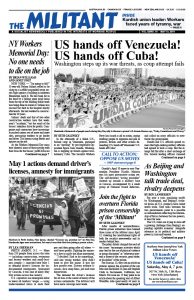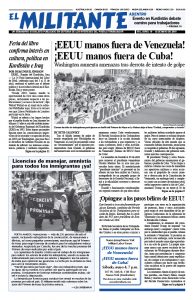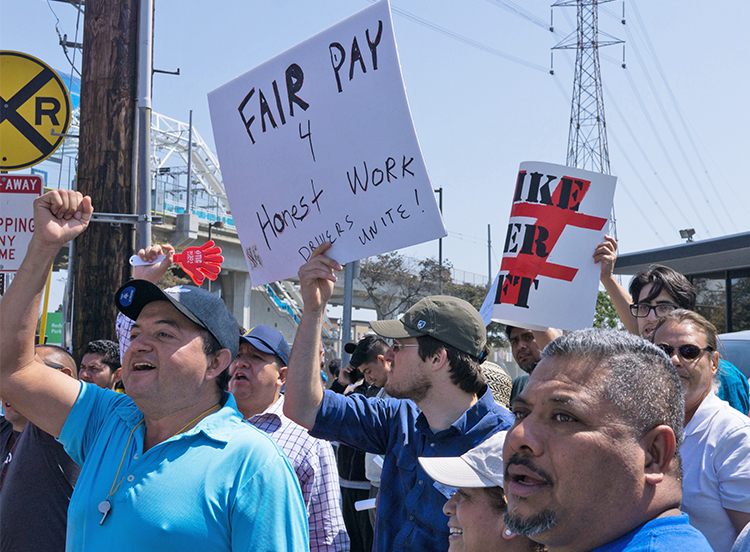As the profit-seeking Uber bosses head toward their first public stock offering, hoping to raise a war chest of some $10 billion, the company’s drivers are planning a strike and public protests in seven cities May 8 over declining pay and poor working conditions. Drivers plan to turn off their apps for 12 hours, demanding higher wages, benefits, and respect in Chicago, Los Angeles, Minneapolis, Philadelphia, San Diego, San Francisco and Washington, D.C.
In Los Angeles the strike is targeting both Uber and fellow e-hail car outfit Lyft. The drivers are demanding that Uber immediately rescind its recent 25% per mile wage cut, and that both companies guarantee drivers a $28 per hour minimum rate — or $17 after expenses, according to the 4,200-member Rideshare Drivers United-L. A., which is organizing the protest.
The Los Angeles action follows a similar protest the group organized March 25 outside the company’s headquarters there to oppose Uber’s wage restructuring scheme.
After drivers in L.A. turn off their apps, they plan to picket at Los Angeles International Airport in the morning and afternoon, hold a noon rally, and have a family picnic from 5-7 that evening.
“We are striking both companies, as both are in a race to the bottom to impress their investors at the drivers’ expense,” Brian Dolber, from Rideshare Drivers United-L.A., told the press.
In March, Uber cut drivers’ pay in Los Angeles from 80 to 60 cents per mile. Soon after Lyft joined in new attacks on drivers, ending “multipliers,” which allowed some drivers to earn more than the base rate of 80 cents per mile.
The bosses are under pressure from investors to begin turning a profit. Uber’s gig-economy owners say their “business model” is to forgo profits in order to crush their competitors and get rich. The investors — who advance money seeking immediate returns — are skeptical. Since Lyft bosses announced their IPO March 18, their stock has continued to fall.
“We want a living wage,” San Francisco Uber driver Mostafa Maklad told Gizmodo website. “Most drivers living in San Francisco are forced to work at least 70-80 hours a week in order to survive in the city. Living expenses increase, gas prices increase, food expenses increase, everything is getting more expensive in order to live in San Francisco. We have to drive more and more, deal with health and stress problems, but Uber doesn’t care.”
Barbara Lloyd, a spokesperson for Chicago Rideshare Advocates, which is organizing the protest there, said drivers’ rates have been cut about $1.75 per mile since rideshare bosses began operating in the city. “This has forced many drivers into poverty,” she said.
The bosses and investors agree that the road to profits has to come off the backs of drivers. Some get starry-eyed about a future where robot cabs will totally eliminate workers. Uber tries to justify wage cuts and other attacks on their drivers by telling them the taxicab drivers’ competition is the problem. Cab barn bosses tell taxi drivers their problem is Uber and other e-hail workers. Nine drivers in New York City alone have committed suicide in the last couple years confronted by mounting debts.
“Drivers in New York City need to look to solidarity and a united fight for one union for all drivers,” says a statement by Seth Galinsky, Socialist Workers Party candidate for public advocate. “When that day comes, workers across the five boroughs and far beyond will side with the drivers, organize solidarity in their fight against their exploiters, and look for ways to emulate their example.”


